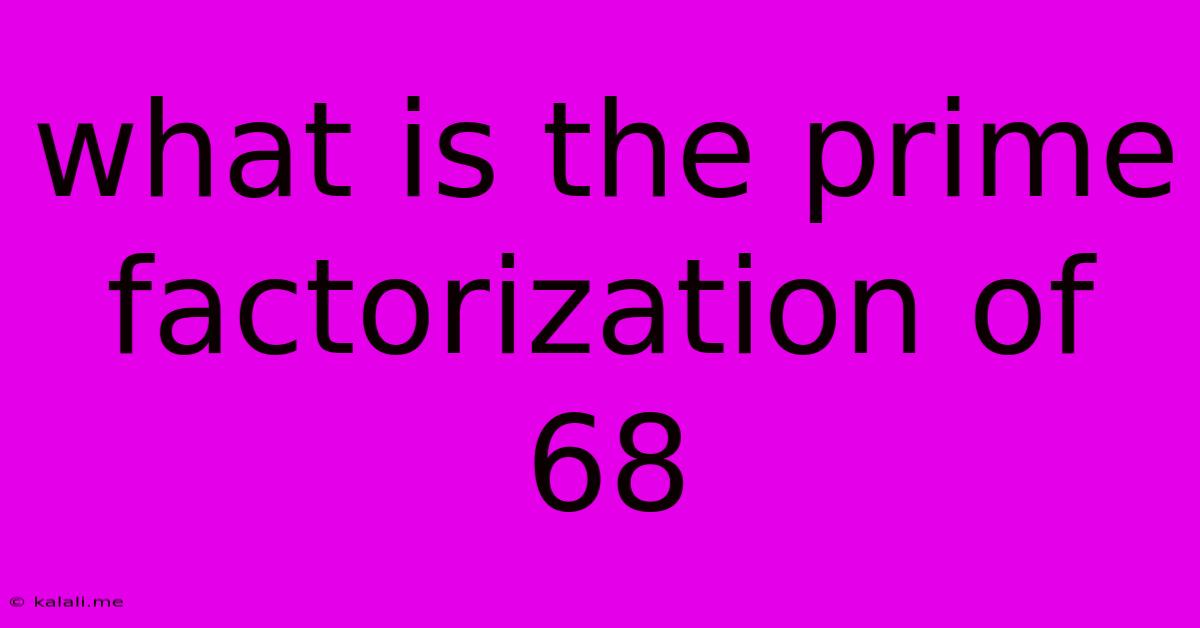What Is The Prime Factorization Of 68
Kalali
Jun 16, 2025 · 2 min read

Table of Contents
What is the Prime Factorization of 68? A Step-by-Step Guide
Finding the prime factorization of a number is a fundamental concept in number theory. This article will guide you through the process of determining the prime factorization of 68, explaining each step clearly and simply. Understanding prime factorization is crucial for various mathematical operations, including simplifying fractions and solving algebraic equations. This guide will equip you with the knowledge and skills to tackle similar problems.
What is Prime Factorization?
Prime factorization is the process of finding the prime numbers that, when multiplied together, equal the original number. A prime number is a whole number greater than 1 that has only two divisors: 1 and itself. Examples of prime numbers include 2, 3, 5, 7, 11, and so on.
Finding the Prime Factorization of 68
To find the prime factorization of 68, we'll use a method called the factor tree. This involves repeatedly dividing the number by its smallest prime factor until we are left with only prime numbers.
-
Start with the number 68: We begin by identifying the smallest prime number that divides evenly into 68. That number is 2.
-
Divide by the smallest prime factor: 68 divided by 2 is 34. We now have 2 x 34.
-
Continue the process: Now we need to factor 34. Again, the smallest prime factor of 34 is 2. 34 divided by 2 is 17. This gives us 2 x 2 x 17.
-
Identify the prime factors: Notice that 17 is a prime number. We have reached the end of our factorization.
Therefore, the prime factorization of 68 is 2 x 2 x 17, which can also be written as 2² x 17.
Understanding the Result
The prime factorization shows us the fundamental building blocks of the number 68. We can see that 68 is composed of two factors of 2 and one factor of 17. This representation is unique to 68; no other combination of prime numbers will multiply to equal 68.
Practical Applications
Understanding prime factorization is vital in various mathematical contexts, including:
- Simplifying fractions: Finding the greatest common divisor (GCD) of the numerator and denominator relies on prime factorization.
- Solving algebraic equations: Prime factorization can help simplify expressions and find solutions more easily.
- Cryptography: Prime numbers play a crucial role in modern cryptography, ensuring secure online transactions.
This step-by-step guide provides a clear understanding of how to determine the prime factorization of 68. Remember, practice is key to mastering this essential mathematical concept. Try applying this method to other numbers to solidify your understanding.
Latest Posts
Latest Posts
-
How To Create Clickable Image In Html
Jun 16, 2025
-
What Are The Factors Of 121
Jun 16, 2025
-
What Is A Theme Of The Passage
Jun 16, 2025
-
A Company That Provides Access To The Internet
Jun 16, 2025
-
Which Word Is Closest In Meaning To The Underlined Word
Jun 16, 2025
Related Post
Thank you for visiting our website which covers about What Is The Prime Factorization Of 68 . We hope the information provided has been useful to you. Feel free to contact us if you have any questions or need further assistance. See you next time and don't miss to bookmark.